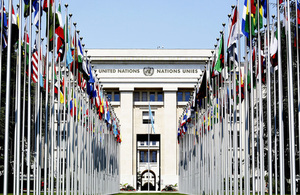World Health Assembly: Health conditions in the Occupied Palestinian Territory
UK statement delivered during the 71st World Health Assembly Committee B Session on Health conditions in the Occupied Palestinian Territory, including East Jerusalem and the Occupied Syrian Golan.

The World Health Assembly takes place at the Palais des Nations in Geneva
The reason for today’s World Health Assembly decision was because of the political situation relating to the Occupied Palestinian Territories, and not because of the health needs of the people in the Occupied Palestinian Territories which are important.
We recognise that conflict, and the absence of peace all affect the health and well-being of millions, often with devastating consequences. Recent events in Gaza act as a further reminder of the pressing healthcare needs.
However, it is notable that the World Health Assembly does not have decisions relating to every conflict, civil war, or political impasse around the world. This remains the only one.
It is important to distinguish between the World Health Assembly and the UN General Assembly. We must not politicise the WHO and argue over geopolitics. To do so would not be in the best interests of those citizens around the world whose health needs are affected.
The UK has been clear that a two-state solution is the only sustainable path for delivering justice, and for improving the lives of both Israelis and Palestinians. A just and lasting solution, that ends the occupation and delivers peace for both Israelis and Palestinians, is long overdue. The United Kingdom is committed to making progress towards this goal.
And whilst our concerns about the conditions for people in the Occupied Palestinian Territories remain, politicising their health needs via the WHO is not the answer. It undermines the WHO’s credibility, as the globally-focused and objective international health body we all support.
Today, the United Kingdom voted, as it has before, against this politicisation of the World Health Assembly. This politicisation must be brought to an end.